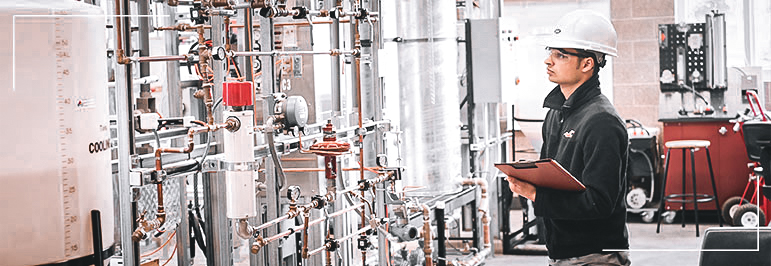Process Technology

Process Technology - AAS
At Bellingham Technical College, the Process Technology Program will prepare you for a position as a process technician or operator for employers in power generation, refining, manufacturing, and many other industries. Process technicians work to ensure the safety standards of production and assembly lines, and oversee quality for an employer’s processes. Currently, our primary employers in Washington State are the four refineries in Whatcom and Skagit counties. Graduates have also gone to work in other water treatment, power generation, and manufacturing facilities in our region, across Washington State, and beyond.
Manufacturing is the most diverse sector of the U.S. economy, from the immense variety of goods produced to the technology used to create them. Turning ideas and materials into valuable products requires highly skilled employees who are trained in advanced manufacturing. BTC’s programs in advanced manufacturing are ideal for students with mechanical aptitude or a strong foundation in math, science, and technology. You’ll learn skills needed for a career in high demand, dynamic industries such as manufacturing, aerospace, biotechnology, and energy.
Employment Information
Data are provided on a program (not credential) level
85% BTC graduate placement rate1
$73,030 starting annual wage2
$88,309 average annual wage2
$99,274 potential annual wage2
| Hours | Starting | Average | Potential | |
|---|---|---|---|---|
| Low | 45 hours/wk | $82,159 | $99,347 | $111,683 |
| Typical | 50 hours/wk | $91,287 | $110,386 | $124,093 |
| High | 55 hours/wk | $100,416 | $121,425 | $136,502 |
Entry Information
When Can I Start?
This program admits students once a year, in the Fall quarter.
What are the Minimum Entry Requirements?
A completed college admissions application and placement in English and math. BTC uses a Guided Self-Placement process to help you choose the best starting point for your English and math courses. Your selections will determine whether you begin with program coursework or complete prerequisites classes first.
To get started or for help determining your English and math placement, contact the Outreach department at Outreach@btc.edu.
What are My Next Steps?
Classes
Total Program Credits: 101
Quarter 1
AM 100 Advanced Manufacturing Pathways 3 CR PTEC 101 Introduction to Process Technology 4 CR PTEC 102 Process Technology I (Equipment) 5 CR AMATH 111 Applied Technical Math 5 CR Quarter 2
CTE 108 Job Skills 1 CR PTEC 103 Safety, Health & Environment I 5 CR PTEC 104 Process Drawings 2 CR PTEC 105 Process Technology II (Systems) 5 CR CMST& 210 Interpersonal Communications 5 CR OR PSYC& 100 General Psychology 5 CR OR SOC& 101 Introduction to Sociology 5 CR Quarter 3
PTEC 110 Process Instrumentation I 5 CR AENGL 100 Applied English 5 CR or higher CHEM& 110 Chemical Concepts w/Lab 5 CR Program Elective (PTEC 190 Series, PTEC 109, or PTEC 224) 3 CR Quarter 4
PTEC 203 Safety, Health & Environment II 5 CR PTEC 211 Troubleshooting 5 CR PHYS& 110 Physics for Non-Science Majors w/Lab 5 CR Program Elective (PTEC 190 Series, PTEC 109, or PTEC 224) 3 CR Quarter 5
PTEC 205 Dynamic Process Control (Simulators) 5 CR PTEC 212 Industrial Processes & Equipment 5 CR PTEC 270 Project I 5 CR OR PTEC 290 Internship I (in summer quarter) 5 CR Quarter 6
PTEC 207 Process Quality Control 5 CR PTEC 215 Process Technology III (Operations) 5 CR PTEC 272 Project II 5 CR OR PTEC 291 Internship II (in summer quarter) 5 CR Electives
Requires six credits of Program Electives in PTEC 109, PTEC 190-199 series, or PTEC 224 PTEC 109 Intro to WWT 5 CR PTEC 190 Food Processing 3 CR PTEC 191 Non-Refining Processes 3 CR PTEC 192 Pulp & Paper Processing 3 CR PTEC 193 Upstream Process 3 CR PTEC 195 Biodiesel Fundamentals 3 CR PTEC 196 Green Energy 3 CR PTEC 197 Cooperative Education 3 CR PTEC 198 Basic Mechanical Skills 3 CR PTEC 199 Power Generation 3 CR PTEC 224 WWT Test Preparation 3 CR
Program Outcomes
After successfully completing the AAS degree, students will be able to:
- Appraise the typical hazards found in process plants, basic PPE, and know the requirements of regulating bodies regarding safety, health, and environmental issues (OSHA, DPT, EPA).
- Combine mathematics, chemistry, and physics theory to apply to process applications such as fluid flow, the nature of heat, chemical reaction, boiling points, vapor pressure and electrical currents.
- Recognize typical organizational structures, economics, and quality control systems of the process technology industry.
- Appraise fundamentals of refining and power generation processes; identify core functions and principles of operation of typical process equipment such as pumps, compressors, filters and dryers, lubrication systems, valves, piping systems, and draw from memory process flow diagrams.
- Integrate the principles of process automatic control and data control systems (DSC) to manage simulated DCS scenarios.
Employment Outlook
Over the next 10 years, according to future retirement data, there will be a great need for trained process operators in the industry, both locally and nationally. Process Technology Program students can expect to earn excellent wages and continue to have job opportunities. Employers across a range of industries want to hire people with strong problem-solving and hands-on skills, who are trained and ready to go.
Criminal convictions may restrict or prevent student participation with internships and employment in this industry.
Our processing technology graduates are readily employable and actively recruited by local, regional, national, and international industries. BTC collaborates with local industry, employers, and our state and local governments to determine the skills our workforce requires to keep the economy strong.
Process technicians may find career opportunities in a variety of industries including: chemical, petrochemical, refining, pharmaceuticals, pulp and paper, power generation, utilities, food and beverage, and water treatment. In many instances, process operators will interface with other technical personnel, such as maintenance electricians, instrument technicians, chemical laboratory technicians, plant engineers, industrial trainers and managers.
Faculty & Support

Brian Aries
Process TechnologyContacts
If you have questions about this program or want help with the admissions steps to Bellingham Technical College, please email outreach@btc.edu.
Current students wanting academic planning and support, can connect with the program Instructor(s) or email AdvancedManufacturingNav@btc.edu
